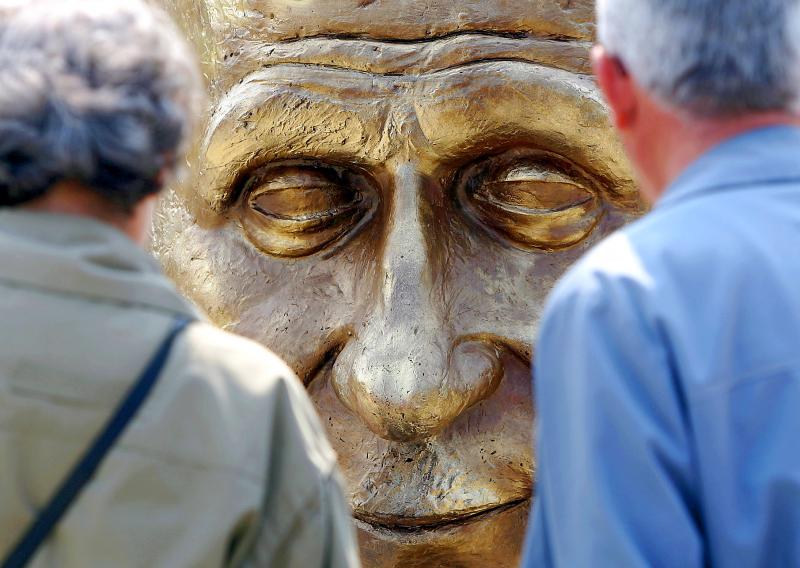By the time he reached his 60s Isaac Hendley could look back proudly on his life as a shoemaker in 18th century London. But when he looked forward he could only see the shame of being “passed to his parish” since his “bodily infirmities” meant the end of his independence and self-reliance.
After a year of grappling with his physical deterioration and fears that “he should come to want,” Hendley took his own life in 1797. An inquest recorded the state of his mind according to the testimonies of friends and colleagues.
Hendley was not alone. A study by Ella Sbaraini, a historian at Cambridge university, published in the journal Social History of Medicine, has found that many older people who took their own lives in the 18th century in England struggled with pain, loneliness and fear of dependency.

Photo: Reuters
Sbaraini scoured records of more than 100 inquest hearings deposited in archives in London, Kent, Cumbria, Essex, Suffolk and Bath, to build up a picture of suicide.
Based on witness evidence, she found that older people who took their life were preoccupied with concerns about loneliness, memory loss, financial vulnerability and worries about becoming a burden on others. Nevertheless, in almost all the cases she studied the inquest verdict was insanity, or non compos mentis.
“The people described in these documents were suffering from a range of age-related illnesses and disabilities, as well as distressing social and financial problems,” said Sabraini. “Many showed great determination to seek out help but they lived at a time when the kind of support now available just wasn’t there.”

Photo: AFP
For her study, Sabraini defined older people as those over the age of 50, in line with life expectancy in the 18th century. Three-quarters of the inquests she studied were suicides by men.
One case that struck her as especially poignant was that of John Braithwate, who drowned himself in Egremont, Cumbria, in 1803. He suffered with “confusion in his head and giddiness and want of recollection” and of frustration that he “could not recollect the most common words and could not express what he wanted to say,” the inquest recorded.
On one occasion, having gone fishing with a friend Braithwate “did not know how he had got home nor what he had done with, nor where he had left, his horse.”
While playing cards he uncharacteristically “broke out into a most violent frenzy without any cause.”
One of his servants said he had “complained much of uneasiness and being afflicted and sayd there must be an end.” He even asked “if she wd put an end to him – he sayd he cd not do it himself.”
Braithwaite had remarked that “he thought it hard that the almighty shd afflict him in that manner,” and he told his surgeon that “death wd be a blessing to him.”
Sarah Fenwick ended her life four months after her husband died. She had moved in with her adult daughter, who “several times told her mother that her family was large and ha[d] perswaded her to go into the workhouse.”
Martha Fuller, a weaver’s wife who killed herself in 1792, had “about twenty years past … the misfortune to loose a child,” her husband said. It had “affected her brain so much” she had attempted “to destroy herself” at the time.
“While memory loss, confusion and behavior changes are now well-known signs of dementia, there was far less understanding and support available in the 1700s,” Sbaraini said.
“For independent, respected, people to lose their grip on the behaviors expected by their community, including politeness and self-control, it must have been extremely distressing. History reminds us how important it is to make sure older people feel a strong sense of purpose and a valued part of society.”

On April 26, The Lancet published a letter from two doctors at Taichung-based China Medical University Hospital (CMUH) warning that “Taiwan’s Health Care System is on the Brink of Collapse.” The authors said that “Years of policy inaction and mismanagement of resources have led to the National Health Insurance system operating under unsustainable conditions.” The pushback was immediate. Errors in the paper were quickly identified and publicized, to discredit the authors (the hospital apologized). CNA reported that CMUH said the letter described Taiwan in 2021 as having 62 nurses per 10,000 people, when the correct number was 78 nurses per 10,000

As we live longer, our risk of cognitive impairment is increasing. How can we delay the onset of symptoms? Do we have to give up every indulgence or can small changes make a difference? We asked neurologists for tips on how to keep our brains healthy for life. TAKE CARE OF YOUR HEALTH “All of the sensible things that apply to bodily health apply to brain health,” says Suzanne O’Sullivan, a consultant in neurology at the National Hospital for Neurology and Neurosurgery in London, and the author of The Age of Diagnosis. “When you’re 20, you can get away with absolute

May 5 to May 11 What started out as friction between Taiwanese students at Taichung First High School and a Japanese head cook escalated dramatically over the first two weeks of May 1927. It began on April 30 when the cook’s wife knew that lotus starch used in that night’s dinner had rat feces in it, but failed to inform staff until the meal was already prepared. The students believed that her silence was intentional, and filed a complaint. The school’s Japanese administrators sided with the cook’s family, dismissing the students as troublemakers and clamping down on their freedoms — with

As Donald Trump’s executive order in March led to the shuttering of Voice of America (VOA) — the global broadcaster whose roots date back to the fight against Nazi propaganda — he quickly attracted support from figures not used to aligning themselves with any US administration. Trump had ordered the US Agency for Global Media, the federal agency that funds VOA and other groups promoting independent journalism overseas, to be “eliminated to the maximum extent consistent with applicable law.” The decision suddenly halted programming in 49 languages to more than 425 million people. In Moscow, Margarita Simonyan, the hardline editor-in-chief of the